|
Here are 10 Greek words that can seriously transform your life if you say and practice them.
1. Eudaimonia (Greek: εὐδαιμονία) Eudaimonia is regularly translated as happiness or welfare; however, “human flourishing or prosperity” and “blessedness” have been proposed as more accurate translations. In Aristotle’s works, eudaimonia was used as the term for the highest human good, and so it is the aim of practical philosophy, including ethics and political philosophy, to consider (and also experience) what it really is, and how it can be achieved. 2. Arete (Greek: ἀρετή) Arete in its basic sense, means “excellence of any kind”. The term may also mean “moral virtue”. In its earliest appearance in Greek, this notion of excellence was ultimately bound up with the notion of the fulfillment of purpose or function: the act of living up to one’s full potential. In the Homeric poems, Arete is frequently associated with bravery, but more often with effectiveness. The person of Arete is of the highest effectiveness; they use all their faculties—strength, bravery, and wit—to achieve real results. In the Homeric world, then, Arete involves all of the abilities and potentialities available to humans. In some contexts, Arete is explicitly linked with human knowledge, where the expressions “virtue is knowledge” and “Arete is knowledge” are used interchangeably. The highest human potential is knowledge and all other human abilities are derived from this central capacity. 3. Phronesis (Greek: φρόνησῐς) Phronesis is a type of wisdom or intelligence. It is more specifically a type of wisdom relevant to practical action, implying both good judgement and excellence of character and habits, or practical virtue. As such, it is often translated as “practical wisdom”, and sometimes as “prudence.” 4. Kleos (Greek: κλέος) Kleos is often translated to “renown”, or “glory”. It is related to the word “to hear” and carries the implied meaning of “what others hear about you”. A Greek hero earns kleos through accomplishing great deeds. Kleos is invariably transferred from father to son; the son is responsible for carrying on and building upon the “glory” of the father. This is a reason for Penelope putting off her suitors for so long, and one justification for Medea’s murder of her own children was to cut short Jason’s kleos. Kleos is sometimes related to aidos — the sense of shame. 5. Xenia (Greek: ξενία) Xenia means “guest-friendship” and is the concept of hospitality. It includes the generosity and courtesy shown to those who are far from home and/or associates of the person bestowing guest-friendship. The rituals of hospitality created and expressed a reciprocal relationship between guest and host expressed in both material benefits (such as the giving of gifts to each party) as well as non-material ones (such as protection, shelter, favors, or certain normative rights). 6. Prosoche - (Gr. προσοχή, attention, mindfulness) - Your brain runs all the time, and it’s either going to run in the direction you want it to go, or it’s going to run all over the place. If you don’t take charge of your thoughts and manage what images you are forming, then you won’t be performing at your peak, or getting the results that you really want. That is why it’s important to observe, organize and manage your thoughts and energy, a process the ancient Greeks called ‘Prosoche’. 7. Nostos (Greek: νόστος) 'Nostalgia' Nostos is a theme used in Ancient Greek literature which includes an epic hero returning home by sea. In Ancient Greek society, it was deemed a high level of heroism or greatness for those who managed to return. This journey is usually very extensive and includes being shipwrecked in an unknown location and going through certain trials that test the hero.The return isn’t just about returning home physically but also about retaining certain traditions and retaining your identity upon arrival. The theme of Nostos is brought to life in Homer’s The Odyssey, where the main hero Odysseus tries to return home after battling in the Trojan War. 8. Oikos (Greek: οἶκος) Oikos refers to three related but distinct concepts: the family, the family’s property, and the house. In Stoic ethics, oikeiôsis (Ancient Greek: οἰκείωσις, Latin: conciliatio) is a technical term variously translated as "appropriation," "orientation," "familiarization," "affinity," "affiliation,"[1] and "endearment."[2] Oikeiôsis signifies the perception of something as one’s own, as belonging to oneself. The theory of oikeiôsis can be traced back to the work of the first Stoic philosopher, Zeno of Citium.[3] and regards stewardship of your family, your home, your community, your planet. 9. Apatheia (Greek: ἀπάθεια) In Stoicism, Apatheia refers to a state of mind in which one is not disturbed by the passions. It is best translated by the word equanimity rather than indifference. The meaning of the word apatheia is quite different from that of the modern English apathy, which has a distinctly negative connotation. According to the Stoics, apatheia was the quality that characterized the sage. 10. Ataraxia (Greek: ἀταραξία) Ataraxia literally translates as “unshakability”, but is generally considered as “equanimity”, or “tranquillity”. It was first used by Pyrrho and subsequently Epicurus and the Stoics for a lucid state of robust equanimity characterised by ongoing freedom from distress and worry. In non-philosophical usage, the term was used to describe the ideal mental state for soldiers entering battle.
0 Comments
Leave a Reply. |
TRY MY 3-STEP METHOD FOR YOURSELF THROUGH THIS FREE
VIDEO-COURSE: Archives
January 2025
Categories
All
|
|
All Rights Reserved 2019 Alkistis Agiorgiti
|




 RSS Feed
RSS Feed
